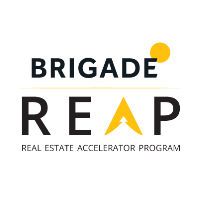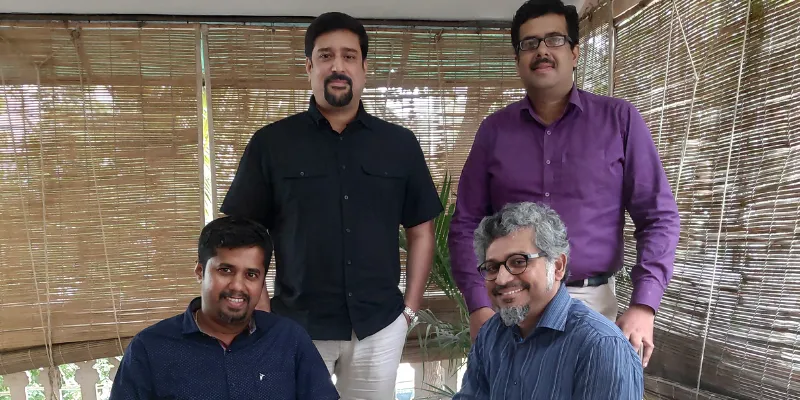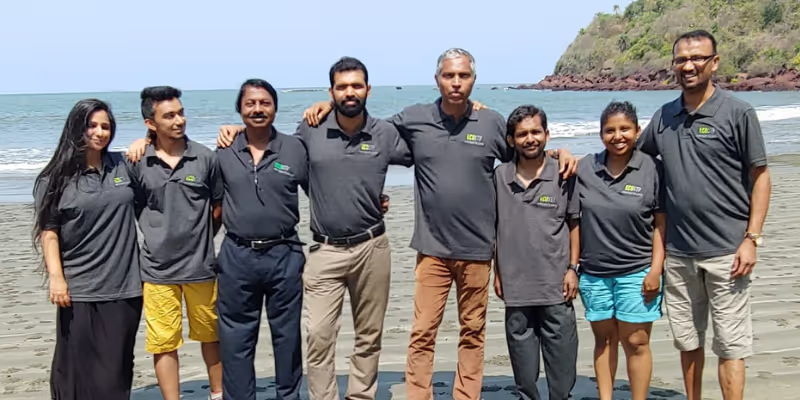
Brigade Real Estate Accelerator Program
View Brand PublisherQwikSpec and ECOSTP, mentored at Brigade REAP, are addressing pressing problems in the real estate industry with their innovations
The Indian real estate market is expected to touch $180 billion by 2020, by which time the housing sector alone is expected to contribute about 11 percent of India’s GDP. Apart from the role it plays in the country’s economy, the construction industry is also a key employer.
However, the sector is largely fragmented and plagued by quality and efficiency issues. The existing construction process in India has several built-in inefficiencies at every stage, right from procurement of materials to the actual construction to quality control. On an average, the wastage per square foot is nearly 80 percent more than what is considered best practice globally. Also, unlike several other sectors, the construction industry has lagged behind when it comes to technology adoption.
Another rising problem in India is the unorganised disposal of sewage, leading to environmental and health issues. Almost 77 percent of India’s sewage is untreated. In Bangalore alone, 40 percent of this untreated sewage is disposed into lakes. While Sewage Treatment Plants (STP) are a solution, conventional STP solutions available today are very complex, consume a huge amount of power, and are time-consuming and difficult to manage.
To address problems such as these, Bengaluru-based Brigade Group launched the Brigade Real Estate Accelerator Program (REAP) to help entrepreneurs create sustainable and scalable businesses in the real estate industry by utilising technology. In the last three years, they have accelerated several startups, one of them being QwikSpec, an end-to-end project site management platform for the construction industry, and ECOSTP Technologies, a 'Zero Power Zero Maintenance’ sewage treatment technology company.
QwikSpec – Real-time analytics platform for the construction sector
Prior to founding QwikSpec in 2015, Ajith Alexander, Co-Founder & Managing Director, worked with companies like Cisco, McKinsey & Co and Nakheel Group (based out of Dubai), where he was involved in the Oil & Gas and infrastructure sector. Roby Kurien, Co-Founder and Director - Engineering, previously worked at SiRF Technology, Kyocera Wireless, Impulsesoft, Sasken and Motorola. "When an individual considers entering the entrepreneurial space, he/she is plagued with doubts," says Ajith. "What if my venture doesn’t make it? What if I end up losing my chances of ever having a steady career? This holds truer if the person already has a well-established career. You are no longer just mortgaging your career prospects but giving up the comforts and security of one that you worked your entire life for. It takes much more courage and conviction then, to take that first leap of faith."
Since childhood, Ajith, whose father is an entrepreneur, was fascinated by how a business operated, the impact it has on people’s livelihood, the legacy one leaves behind as well as the ups and downs of entrepreneurship. Also, in all of the three companies he worked in, he noticed a significant gap between on-field construction workers and the management, a gap that reduced the productivity of labour by a large margin. These experiences helped him understand the pain points in the industry, and were the origin for the idea of building an operations platform for the construction and infrastructure industry which provides real-time data and analytics. Reconnecting with his engineering classmate Roby was the boost Ajith required to go forward with the venture. Roby had already left his corporate life to run a startup in the adventure tourism sector. Together, they founded QwikSpec in 2015, with funding from friends and family.

QwikSpec Team
A Bengaluru-based construction site operations and analytics platform, QwikSpec gathers data from various stakeholders on a project site, and furnishes insights that lower cost, save time, and exponentially improve quality. India’s first end-to-end project site management platform for the construction industry, it helps capture real-time data analytics at each stage of the real estate construction cycle, from the process of assembling materials to auditing to handing it over to the customer, and tracks progress for better onsite execution.
The founders started with a seed capital of 20 lakhs, and the biggest challenge initially was to nail down the actual use case and get the product workflow right to make it so relevant for a customer that they would be willing to pay for the solution. They tackled this by getting a pilot customer with whom they worked closely to get the correct use case, the various workflows, and product features built. Once they did that, they were confident that they had a product to monetise and scale.
Manual processes are now done through a mobile app. “The Real Estate Regulatory Authority (RERA) specifies that every construction project provide a warranty of five years after handover for structural defects. In this scenario, having an audit trail of site operations becomes extremely useful,” says Ajith. In the mobile app, a contractor raises a work inspection request. The entire cycle of rejections, approvals and resubmittals gets registered on their server as separate reports. It records KPIs and helps resolve on-site issues at regular intervals, and the data also provides regular insights for the management team to take timely decisions.
Ajith says that what makes their platform unique is the creation of an industry benchmark, vendor and contractor evaluation and powerful workflow engine that allows any site workflow to be configured for site deployment in 48 hours. They also have three variants available – (i) Enterprise, (ii) Standard, (iii) Lite, which address different tiers of companies in the industry. The platform has delivered, on an average, 40 percent reduction in rework cost, 35 percent improvement in labour productivity and time to complete tasks and up to 75 percent improvement in product quality and brand value with customers.
Going forward, they want to not only be adopted by large builders and contractors but also by Tier 2/3/4 builders, affordable housing developers, interior fit-out companies and also financial institutions that lend to the sector. “We intend to expand overseas by the end of the current financial year – especially to the Middle East and South East Asia,” says Ajith.
ECOSTP – Sewage treatment technology inspired by cow’s stomach
ECOSTP Technologies Ltd was founded in 2017 by Dr. E Muralidharan, Simar Kohli, Tharun Kumar and Praseed KK. The co-founders come with varied experience, ranging from filmmaking to sustainability, to medicine and product design. What’s common is that all of them are deeply committed to solving the sewage and water reuse problem in India.
Tharun, who is an engineer with more than 20 years of leadership experience in sustainability and cybersecurity, says, “My mission is to solve the global water crisis by reusing sewage, starting from India.” He lives near the Varthur Lake in Bengaluru, which was once known for its beauty. But now it’s infamous for being inflammable due to all the chemical present in the water. “Bengaluru has 14 million people, and nearly half of what they flush reach the lakes. The solution is to implement Sewage Treatment Plants (STP), but conventional STPs need power and India has a significant energy shortage,” says Tharun.

ECOSTP Team
Through ECOSTP, they wanted to address five key pain points – huge power requirement to run conventional STPs, health of STP operators as conventional STP need regular cleaning, health of citizens as the area is exposed, untreated sewage spreading diseases and killing millions, lakes being lost. ECOSTP’s ‘Zero Power Zero Maintenance’ sewage treatment technology has no moving parts like those in conventional STPs which use energy-hogging motors, exhaust fans, pumps and blowers.
Along with environmental experts and academia, they set up a novel sewage treatment system in Tharun’s neighbourhood, taking inspiration from the cow’s stomach, leveraging a concept called biomimicry. They replicated the chambers in a cow’s stomach and came up with a civil engineering design which can be used for natural treatment of sewage. To summarise, it runs on zero power, has flexible designs based on land availability, doesn’t need operators, is sealed and poses no health hazards, has no wastage of land, stench and sludge creation. Also, it has less capex and 93 percent less opex, and less sewage ends up going into lakes.
When they started up, it was a challenge to sell their concept. “No one would believe that sewage could be treated without motors,” says Tharun. But what makes them stand out from their competitors is a passionate leadership team with an in-depth understanding of customer requirement, and access to real estate industry insights from Brigade REAP.
ECOSTP now has 20 customers and 37 ongoing projects, with several recognitions from the Ministry of Micro, Small and Medium Enterprises (MSME), Government of India, EPA Pollution Control Board, approval from the Department of Industrial Policy and Promotion, and so on. The startup was discussed at the 8th World Water Forum (Brasilia, 2018) and subsequently selected as a best practice case study for the United Nations Sustainability Asia-Pacific report. They debuted at Circularity 19, the largest circular economy event in North America. Beth Rattner, Executive Director from Biomimicry Institute, who are also their mentors, presented ECOSTP's cow funda during the event. ECOSTP was also featured as the coolest startup by Business Today recently.
So far, they have treated 11048 KL water and saved 18 MW power. They are now focusing on the B2B marketplace with the goal of ‘Toilet to Tap' to reuse wastewater for drinking. “The water on our earth today is the same water that’s been here for nearly 5 billion years. Only a tiny bit of it has escaped out into space. As far as we know, new water hasn’t formed either. That means there’s a very high chance the water in your glass is what thirsty dinosaurs were gulping down about 65 million years ago. So it’s alright to drink sewage water, if treated well,” says Tharun.
Life for the startups after Brigade REAP
QwikSpec was part of the first cohort of the Brigade REAP accelerator in 2016. They heard about the programme through a newspaper article where Nirupa Shankar, Director of Brigade Group, spoke about the launch of a first-of-its-kind Prop-tech accelerator. They reached out to her to be a part of the programme, and the journey to scale began. They got access to technology partners like Microsoft, which provided them tools they could leverage to enhance and build new features in their platform. They also got exclusive mentorship to refine their business plan and customer value proposition, access to real estate industry associations across the country, and funding agencies to pitch to. Ajith says, “Having the Brigade REAP team as mentors was of great value because it not only helped refine our business plan but also opened doors for us in the industry to acquire new clients as well as got us access to sector-focused investors. These benefits we obtained from the program more than made up for the small stake we gave the accelerator.” He adds, “Rather than being generic, it focuses on solving problems in the real estate and construction industry. Startups with a focus on real estate, both B2B and B2C, can benefit from the knowledge of experts, technology partners, access to industry associations, and investors.”
Since being accelerated, QwikSpec has had 30+ clients including Tata Housing, Mahindra Lifespaces, Brigade Group, Mantri Developers, K Raheja Group, and so on. In all these companies, QwikSpec’s app has replaced WhatsApp as the primary means of communication with regards to workplace data management. “Today we have projects that use the platform from Kasauli in the North to Kochi in the South, and Mumbai in the West to Bhubaneshwar in the East. The platform has accumulated more than 300 million construction data points from across 200 projects where its deployed across the country. This allows the company to provide first-of-its-kind industry insights and benchmarks,” says Ajith.
For ECOSTP Technologies, their past corporate experience taught them that for any new venture to succeed you need human, financial and social capital (network, domain connect, customer knowledge). “To get access to real estate markets and especially insights and strategic investors, we applied for and got selected into the Brigade REAP, in return for a small equity stake,” says Tharun. ECOSTP was part of the accelerator programme in 2018, and was able to work out an IOT strategy for their STPs. They have created a proprietary software to design their solutions and are also doing multiple projects for Brigade now.
Tharun adds, "With Brigade REAP, we constantly get insights about the marketplace and can spot trends early on. Specifically, we learned that ‘commercial buildings’ are a big STP market opportunity, but the ‘pain’ is not big as STPs are maintained well by well-paying corporate clients who don’t care about the cost involved, and cost economics is key." Today, thanks to Brigade REAP, ECOSTP has moved from having zero clients to 20 clients in a span of a year.







